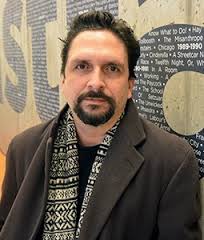07 Mar Interview with a Playwright: Carlos Murillo
 Before he flies out to San Francisco for next week’s reading, we got to chat with playwright CARLOS MURILLO about his play, Killing of a Gentleman Defender. It’s the fifth play in our Rough Readings Series, which is always PAY WHAT YOU CAN!
Before he flies out to San Francisco for next week’s reading, we got to chat with playwright CARLOS MURILLO about his play, Killing of a Gentleman Defender. It’s the fifth play in our Rough Readings Series, which is always PAY WHAT YOU CAN!
Monday, March 13 7:30PM – Roble Hall, Stanford University campus
Tuesday, March 14 2:00PM – Custom Made Theatre, San Francisco
What intrigued you about the real-life incident of Andrés Escobar?
I vividly remember the event when it took place in 1994. On the one hand, the notion that someone would lose their life over a mistake in a soccer game boggled the mind – but given the situation in Colombia at the time it was, disturbingly, not surprising. Being the son of a Colombian father, and having lived in Bogota for two years as a child, the story was another example of violence-driven national shame. Life was cheap in those days in Colombia due to the warring drug cartels and the ongoing war between insurgent groups, paramilitary groups and the government. I was reminded of the incident during the most recent World Cup in Brazil, which I followed avidly along with my young son, who was just getting into soccer at the time. I was in bar in NYC at one point during the tournament watching a game on ESPN – after the game was over the network aired a 30 for 30 documentary called THE TWO ESCOBARS, which tells the tale in vivid detail. It’s an incredible film that comprehensively unpacks the intersections of sport, national identity, societal divisions in Colombia, corruption and ultimately lawlessness. Revisiting the story I felt that first thrum in my gut that there might be a play in here.
Later in the tournament, Colombia reached the quarter finals and seemed to have a real shot at advancing. Again, I was in NY with my wife and two children. We went to my Colombian father’s apartment in Jackson Heights to watch the game. If you don’t know Jackson Heights, it’s NYC’s Colombian enclave. The day of the game the streets were packed with people wearing the yellow jersey, waving the Colombian flag – celebrating the way only Colombians can. It was quite the scene – I recall being hyperconscious of the fact that the Escobar murder happened almost 20 years to the day. In a sense, this game was felt as a kind of redemption for Colombia’s shame that took a generation to overcome.
Colombia lost the game. After the match, we left my father’s apartment and found ourselves among a sea of yellow jersey wearing Colombians celebrating as if they had won. Music blared, drink flowed freely, bodies danced on the sidewalks. My wife turned to me and said: “This is incredible – see? We should go to Colombia.” I have not set foot in Colombia for 30 years and have resisted going back. My reaction was totally different – I remember saying something to the effect, “This is exactly why I DON’T want to go to Colombia.”
That moment made me reflect a lot on my ambivalence about Colombia, which is half of my origins. And that ambivalence is what gave birth to the play.
Martin is so persistent in using metaphor in his project. Is that a recurrent theme you use in your work? And why metaphor?
Martin’s search for metaphor mirrored my own search for one as I wrote the play. The question nagged at me throughout the writing process – why write a play about a soccer game and murder that happened 20 years ago in a country 3000 miles away? I constantly called into question its very reason for being. Living in Chicago, we’ve been plagued by a significant spike in gun violence over the last several years, and that violence sometimes comes closer to home than I would like it to, especially being the father of two children. Like many Chicagoans, I feel pretty helpless in my capacity to do anything to help the crisis – as an artist I sometimes feel even more helpless, as I can’t think of a single play that’s responsible for taking a gun off the street. Trying to connect the violence in Chicago with the violence in Colombia that killed Andrés Escobar seemed like a ridiculous stretch, which is what made it perfect. A completely imperfect, perhaps illegible and certainly overreaching metaphor.
I think this is closely linked with Martin’s identity crisis. He has his feet planted in two worlds – he’s divided in so many ways: he’s Colombian but he can hide that identity when needed; he identifies as an artist, but in the play he’s performing a social service; he’s middle aged yet he’s charged with connecting to the lives of teenagers; he’s middle class yet he’s being asked to speak for the urban underclass. I believe we reach for metaphors when we are unable to bridge opposites – Martin’s reach for a metaphor is an attempt at finding a coherent identity. Whether he can succeed or not… that is the question.
From writing this play, what have you learned about the role of outsiders who attempt to understand/help/intervene in the face of violence?
I’m not sure if the play has led me to any more clear conclusions about this. If anything, it deepened my questions about it, and made me more conscious of what it means to be that outsider trying to use art to help a community. I have a Mellon National Playwright Residency at Adventure Stage, a TYA theatre that is part of a larger social service organization, The Northwestern Settlement, a 125 year old organization that exists primarily to help end the cycle of generational poverty in Chicago. As a company, we have frequent interaction with young people, families and members of the community through our training programs, productions and play development process. Being embedded in this organization after grappling with these questions in the play has made me think differently about the day to day interactions we have with, say, Chicago Public School students. One of our mantras when we visit classrooms as part of our development process is to say up front to the young people, “You are the experts in the room,” and approaching them from a place of listening.
What is the biggest discovery you have made in the process, about yourself or about the subject matter?
I would say that writing the play revealed to me the reasons behind my ambivalence about Colombia and my hesitation to return. When I lived there I was in 4th and 5th grade – roughly around the age of my son and daughter at the time of the 2014 World Cup. We lived a really advantaged life there – my father worked for Bank of America, so as a family we reaped the benefits of being international corporate transfers – we went to excellent schools, lived in a beautiful home in an affluent neighborhood and enjoyed many perks. Yet, we were not immune to the violence that was rampant in Bogota, nor were we immune to the very clear class delineations that surround you in Colombia. There were a number of incidents that drew in sharp relief the precariousness of life there – the most notable being my oldest brother’s survival of a violent assault that might very well have ended his life were it not for good luck and his tenacity. Writing the play reminded me I was my children’s age when all that went down. I never realized that I had experienced childhood trauma until that reality sunk in. It made me ask – are my kids traumatized by the violence in Chicago? In our neighborhood? How do they experience the fact that their parents are of the creative class, with good enough jobs to ensure that they can go to private schools, yet they live in a city where the divide between haves and have nots could not be more stark, where violence plagues some neighborhoods, while other neighborhoods seem bucolic.


No Comments